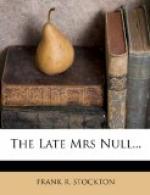It was very natural when Lawrence reached New York, that he should take pleasure in talking about Miss Roberta March and her family with any one who knew them. He was particularly anxious, if he could do so delicately and without exciting any suspicion of his object, to know as much as possible about Sylvester March, the lady’s father. In doing this, he did not feel that he was prying into the affairs of others, but he could not be true to himself unless he looked well in advance before he made the step on which his mind was set. It was in this way that he happened to learn that about two years before, Miss March had been engaged to be married, but that the engagement had been broken off for reasons not known to his informants, and he could find out nothing about the gentleman, except that his name was Junius Keswick.
The fact that the lady had had a lover, put her in a new light before Lawrence Croft. He had had an idea, suggested by the very friendly nature of their intercourse, that she was a woman whose mind did not run out to love or marriage, but now that he knew that she was susceptible of being wooed and won, because these things had actually happened to her, he was very glad that he had come away from Midbranch.
The impression soon became very strong upon the mind of Lawrence that he would like to know what kind of man was this former lover. He had known Miss March about a year, and at the time of his first acquaintaince with her, she must have come very fresh from this engagement. To study the man to whom Roberta March had been willing to engage herself, was, to Lawrence’s mode of thinking, if not a prerequisite procedure in his contemplated course of action, at least a very desirable one.
But he was rather surprised to find that no one knew much about Mr Junius Keswick, or could give him any account of his present whereabouts, although he had been, at the time when his engagement was in force, a resident of New York. To consult a directory was, therefore, an obvious first step in the affair; and, with this intent, Mr Croft entered, one morning, an apothecary’s shop in a street which, though a busy one, was in a rather out-of-the-way part of the city.
“We haven’t any directory, sir,” said the clerk, “but if you will step across the street you can find one at that little shop with the green door. Everybody goes there to look at the directory.”
The green door on the opposite side of the street, approached by a single flat step of stone, had a tin sign upon it, on which was painted:
“Information
of every variety
furnished within.”
Pushing open the door, Lawrence entered a long, narrow room, not very well lighted, with a short counter on one side, and some desks, partially screened by a curtain, at the farther end. A boy was behind the counter, and to him Lawrence addressed himself, asking permission to look at a city directory.




